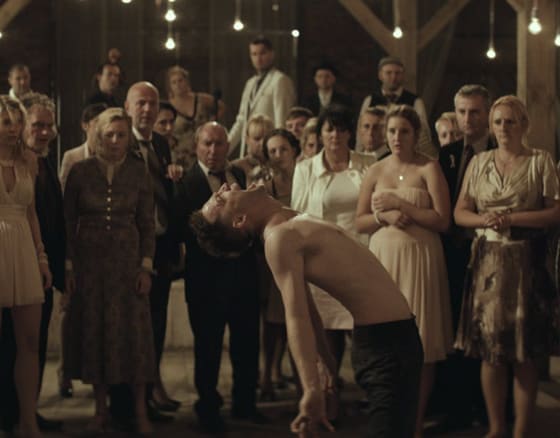Polish writer/director Marcin Wrona delivers an atypical take on the traditional possession tale with an expectation-flouting supernatural thriller that is as subtly menacing as it is unexpectedly funny and tender.
Demonstrating strong authorial sensibilities, the director of The Christening sets a sinister stage through technique alone. There's nothing inherently unsettling about the story's setup, in which Peter, an English-Israeli man (Itay Tiran, Lebanon), arrives at his fiancé's swank family home in the Polish countryside to prepare for their wedding; it's how cinematographer Pawel Flis moves the camera with the graceful inching predatory gait of a stalking panther, and how the dissonant strings and dancing oboe of Marcin Macuk and the legendary Krzysztof Penderecki's score undercuts the idyllic landscape and hints at the thinly veiled chilly distance between the groom and his imminent in-laws, that imbues the scene with unshakeable dread.
Wrona's script, based on Piotr Rowicki's play Adherence, handily establishes relationships and general character traits through natural dialogue exchanges, giving the audience the information necessary to feel up to speed on the rather standard situation while withholding enough to allow some of Peter's outsider status to bleed into the viewer's experience and enhance the nagging sense of unknown danger that permeates the picture.
That unsettling phantom itch is given form when, while looking over the old family homestead the almost-weds will be moving into, Peter spots what appear to be human remains. This discovery precipitates radical changes in Peter's behaviour, worrying his betrothed, Zaneta (Agnieszka Zulewska), and her family members, who were already concerned that the couple hadn't known each other long enough to be getting married. The wedding proceeds despite Peter's increasingly bizarre and erratic actions, Zaneta eager to prove her loyalty to her husband and her family hell bent on putting on a front of normalcy for the guests by blaming all weirdness on alcohol.
Sweeping unsavoury truths under the rug and the past coming back to haunt the present are themes favoured in Wrona's work that he explores again in Demon to varying degrees of success. Particularly, the dynamic between a doubtful priest and an atheistic doctor in the third act feels rushed and slight, missing a grand opportunity for philosophical discussion, instead following a slightly muddled and quite insular plot branch likely to lose viewers lacking cultural and historical context. All the same, there is a dour universality to Wrona's presentation of the easy allure of denial and avoidance in this refreshing spin on the restless ghost story.
(Telewizja)Demonstrating strong authorial sensibilities, the director of The Christening sets a sinister stage through technique alone. There's nothing inherently unsettling about the story's setup, in which Peter, an English-Israeli man (Itay Tiran, Lebanon), arrives at his fiancé's swank family home in the Polish countryside to prepare for their wedding; it's how cinematographer Pawel Flis moves the camera with the graceful inching predatory gait of a stalking panther, and how the dissonant strings and dancing oboe of Marcin Macuk and the legendary Krzysztof Penderecki's score undercuts the idyllic landscape and hints at the thinly veiled chilly distance between the groom and his imminent in-laws, that imbues the scene with unshakeable dread.
Wrona's script, based on Piotr Rowicki's play Adherence, handily establishes relationships and general character traits through natural dialogue exchanges, giving the audience the information necessary to feel up to speed on the rather standard situation while withholding enough to allow some of Peter's outsider status to bleed into the viewer's experience and enhance the nagging sense of unknown danger that permeates the picture.
That unsettling phantom itch is given form when, while looking over the old family homestead the almost-weds will be moving into, Peter spots what appear to be human remains. This discovery precipitates radical changes in Peter's behaviour, worrying his betrothed, Zaneta (Agnieszka Zulewska), and her family members, who were already concerned that the couple hadn't known each other long enough to be getting married. The wedding proceeds despite Peter's increasingly bizarre and erratic actions, Zaneta eager to prove her loyalty to her husband and her family hell bent on putting on a front of normalcy for the guests by blaming all weirdness on alcohol.
Sweeping unsavoury truths under the rug and the past coming back to haunt the present are themes favoured in Wrona's work that he explores again in Demon to varying degrees of success. Particularly, the dynamic between a doubtful priest and an atheistic doctor in the third act feels rushed and slight, missing a grand opportunity for philosophical discussion, instead following a slightly muddled and quite insular plot branch likely to lose viewers lacking cultural and historical context. All the same, there is a dour universality to Wrona's presentation of the easy allure of denial and avoidance in this refreshing spin on the restless ghost story.
